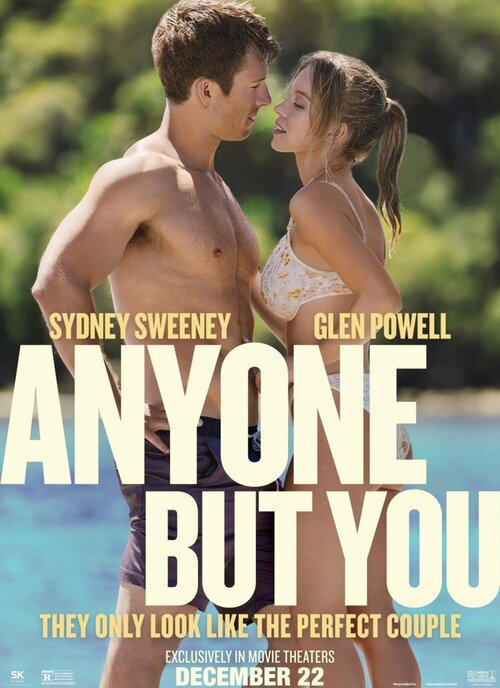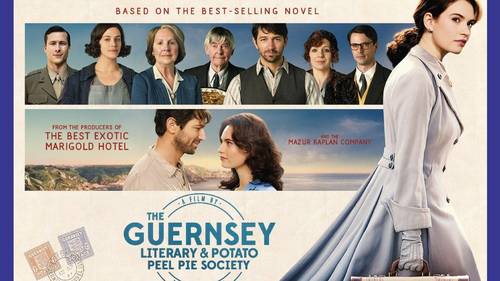*This post features affiliate links. If you purchase through them I make a little something at no extra cost to you.
Anyone But You is the 2023 romcom starring Sydney Sweeney and Glen Powell that has brought more than $210 million at box offices worldwide against a 25 million budget, giving romcom lovers and writers hope everywhere.
As a romcom writer and fan, I was curious to see if the film would meet my expectations and it has. Before I get into the spoiler-including analysis of the film’s haters-to-lovers trope, let’s talk briefly about the film and the plot so that you can decide if you want to see it.
Based loosely on Shakespeare’s Much Ado About Nothing, Anyone But You centers on Bea (Sweeney) and Ben (Powell) who have a great first meeting but “circumstances” turn their initial attraction and bond into “hatred.”
So when Bea’s sister and Ben’s good friend announce their engagement, these two are less than thrilled to have to spend a few days together in the same (albeit big and gorgeous) house. To prevent Bea and Ben from destroying the wedding with their animosity, the parents, brides-to-be, and friends plot to get Bea and Ben together. Noticing this early on, the duo fakes their relationship to get everyone off their back and help Ben get back together with an ex who happens to be his best friend’s cousin.
Expectedly, faking a relationship is never not complicated or hilarious.
My thoughts on Anyone But You
I really liked the movie. Was it always perfect? No. But it was a sweet and entertaining comedy with a great cast including Dermot Mulroney, Rachel Griffiths, and Bryan Brown. Haters-to-lovers trope rarely includes mature characters, and this one is no exception. So yes, there will be some cringy moments and scenes where you want to shout “Why don’t you just talk honestly?” to the main characters. But as a whole, it’s a satisfactory R-rated romcom, and I wouldn’t mind seeing Powell and Sweeney play a couple again in another movie, hopefully, another romantic comedy.
The problem with haters-to-lovers:
As far as romance tropes go, this is one of my least favorites. I don’t believe two people who get on each other’s nerves can ever make a compatible couple. And does anyone still buy into the myth of “If they are mean to you, it’s because they like you.”? Sure, the world has billions of people. There must be people who do confuse flirting with bullying or just downright being insufferable around the person they are crushing on. But that’s not a healthy attitude, and the relationship will be a disaster.
But you can of course play around with tropes and give it your own twist. I did in my romcom novel A Change Would Do You Good. When my protagonists Kevin and Janie first meet, it’s all sparks and chemistry. They are new neighbors, and they are nice to one another. The problem is, Kevin finds her incredibly attractive while Janie is still recovering from a loss and isn’t ready to date anyone. And just when he thinks something is going to happen, she’s thinking they are making good friends. It’s when their wildly romantic pasts and current expectations clash that they turn into haters. But the sparks and chemistry are always there, and they are two people in their 30s. You can bet they don’t stay in the haters zone for long.
Bea and Ben follow a similar pattern. When they first meet, it’s fireworks. Their first date is the stuff of dreams. But two misinterpretations start an immature animosity. They have never really hated each other, though. They just hated thinking the other person didn’t feel the same way. And we are all prone to being a little childish when we are majorly disappointed.
And who doesn’t want to spend the majority of 103 minutes at a gorgeous villa in Sydney?
Romcoms are supposed to be predictable
Yes, and that’s why we love them. I just read a review that bashed Anyone But You for capitalizing on the looks of how the lead actors are and predictability.
News flash: 99% of romcoms – whether book, movie, or film – love to feature hot characters. We want to be with one character and we want to be the other. And if it’s not predictable in certain ways, then it’s not a romcom. If you don’t give us a couple who fall madly in love and stay together, it’s not what we wanted.
Now, not all romcoms are created equal. Some will be steamier. Some will be cleaner. Some will surprise you more. Some will be more annoying. And of course, one person’s cringe is another one’s favorite love story. There are several extremely popular romcoms that I hate. So while severely disagreeing with that one reviewer, I do respect their right to hate it – just not the reasons they gave for it.
My only beef with the movie…
It makes me feel old. While I’m from the same generation as Glen Powell, I’m just not ready to watch Dermot Mulroney as an adult’s dad or the supporting guy in a romantic movie. Whether he’s marrying his adorable girlfriend (My Best Friend’s Wedding), falling in love big time while fighting cancer (Griffin and Phoenix), or realizing he’s marrying the wrong woman after all (The Family Stone), I need him in the lead role in a romantic movie. 🙂
Other featured tropes in the film:
- Love/attraction at first sight
- Close Proximity
- Plotting friends and family
- Fake relationship
Also recommended:
- The Hating Game. As immature as the characters can be, they at least have a somewhat valid reason to hate each other. I loved both the movie and the book.
- Much Ado About Nothing (93 movie). You might not be in the mood to read Shakespeare, but what if you could watch a period romcom starring Emma Thompson, Kenneth Branagh, Denzel Washington, Michael Keaton and Keanu Reeves?
- Griffin and Phoenix. Yes, watch My Best Friends’s Wedding and The Family Stone if you haven’t already. But Griffin and Phoenix is a romantic drama that is superior to both romcoms. And this is huge coming from me because I’m usually not in the mood for watching romantic films where both characters might die and a happy ending is improbable. But like I’ve covered in my book How to Write the Ultimate Non-Tragic Romance, it is one thing to suddenly tell your audience/reader that your character has cancer after they have invested in their relationship versus telling them right away. When the audience knows right away, all the drama feels more organic and it will be sadder. And it’s a healthy, realistic, sweet, and sexy romance between two adults – which is unfortunately not done that often.
*
Have you seen any of the movies I mentioned in the post? What did you think? Comment away. 🙂

